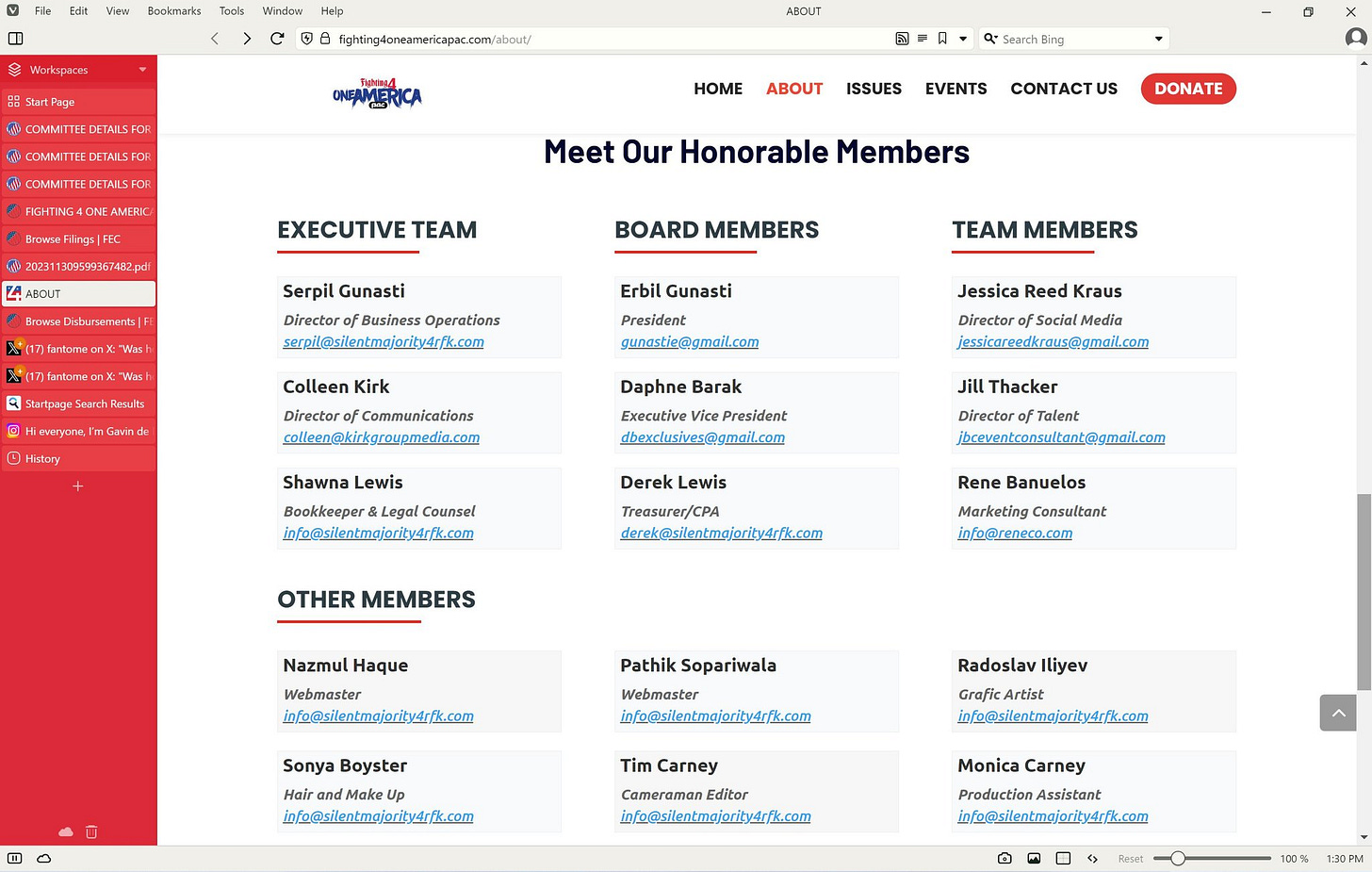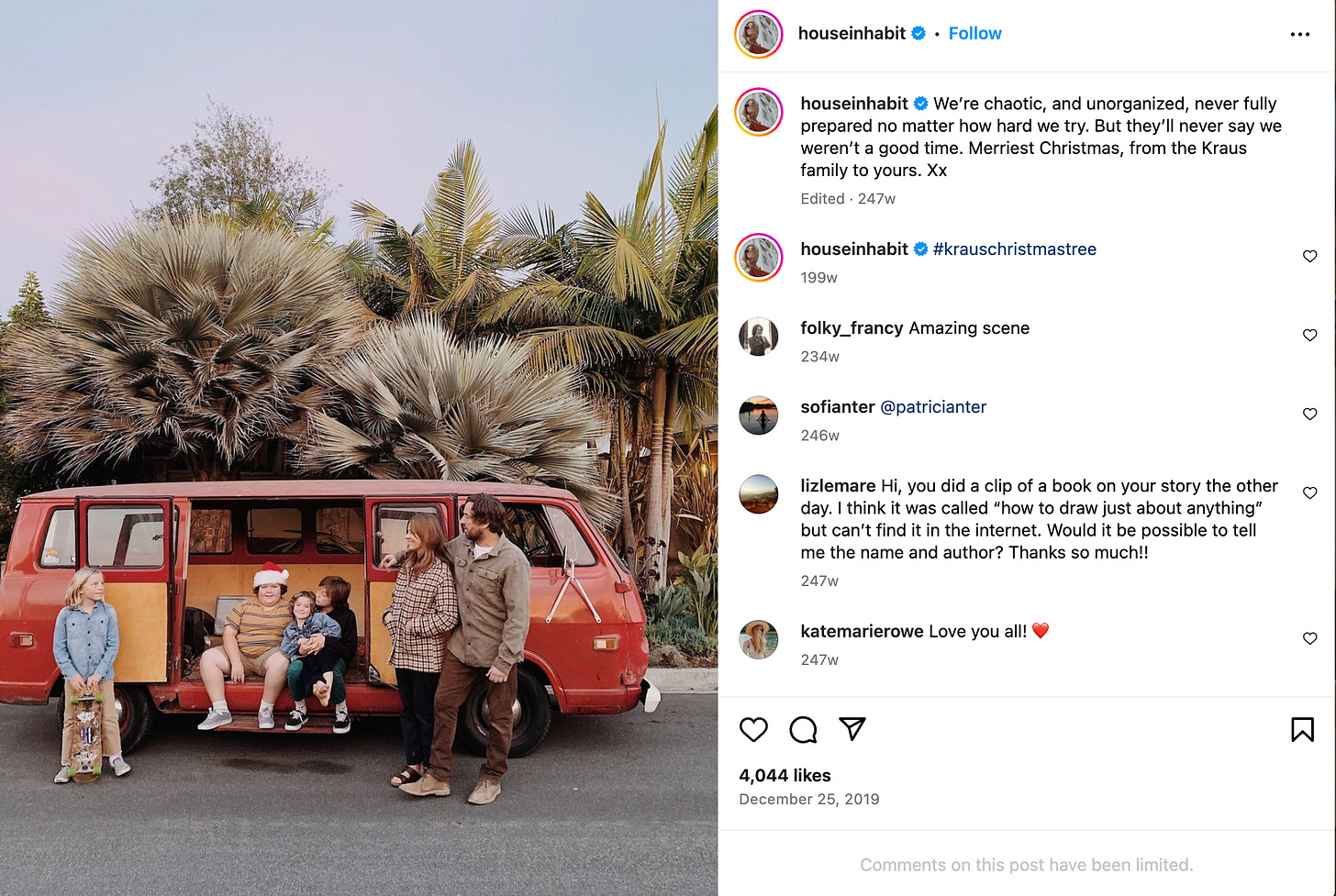Olivia Nuzzi, House Inhabit, and the Rise of the Influencer Journalist
Influencers like Jessica Reed Kraus blur the line between journalism and entertainment, raising concerns about their growing access to political figures and the impact on public trust in news.
If you read news or scroll Instagram, you’ve likely now heard of the Olivia Nuzzi-RFK Jr. sexting scandal. Or maybe it just rings a bell because stories of journalists involved in sexual misconduct have become almost as common as political scandals.
This one plays out like a Spielberg political thriller: a young, attractive journalist on the campaign trail interviews an older, ruggedly-handsome candidate. Shared smiles turn to laughter, jokes reveal a deeper connection, and after the interview, the texting starts—demure at first but never mindful, soon escalating to suggestive photos and dark late-night calls tight with sexual tension.
Or something like that.
By engaging in what’s now being called a “digital affair” with a subject, Nuzzi shattered the trust of her readers, her publication, and journalists at large. Journalists who already labor under the weight of the American public’s growing distrust in “mainstream media” and the rise of decentralized news consumption through social media threatening the institutions that once brought us clarity on major scandals like Watergate, Iran-Contra, and the NSA surveillance revelations.
The story of journalists in inappropriate relationships with sources, political figures abusing power for weird sex, and a struggling media industry (2024 saw record newsroom layoffs), has been told, and retold. Today, let’s tell a different story.
For this one, accompany me to sun-soaked San Clemente, California, 2010s, where a lifestyle influencer known as House Inhabit is in the throes of a chaotic home renovation (is there any other kind?). Jessica Reed Kraus, the quintessential 2010s mommy-blogger, rose to prominence with aesthetic shots of her wild-haired boys, her effortlessly cool style, all set against the backdrop of one of California’s most beautiful coastal towns. She voted Democrat and wasn’t afraid to talk about it, but didn’t often because she is, after all, a mommy-blogger.
Then 2020 hit, and COVID made her see the light (not that light), and Kraus went from woke to… whatever the opposite of woke is. She began to see Big Pharma as the enemy, pushing illegitimate vaccines and medications, a stance that opened the door to her reinvention. Kraus’s deep dive into the Depp vs. Heard trial propelled her to internet stardom, and with it came her growing mistrust of the mainstream media (MSM), which she accused of twisting the facts to push a feminist agenda.
By 2022, Kraus had officially transitioned from lifestyle influencer to celebrity gossip content creator, often teasing “exclusive sources,” and “breaking news” on her platform. In addition to Depp vs. Heard, she has covered high-profile cases like Harvey Weinstein and Ghislaine Maxwell.
Fast-forward to 2023, where Kraus is hot on the campaign trail with Robert F. Kennedy Jr, offering followers a personal and inside look into the candidate’s campaign. Robert F. Kennedy Jr.’s “Make America Healthy Again” (MAHA) platform inspired the loyalty of mothers across the nation, weary of vaccines, Big Pharma, Big Tech, and other corporate giants profiting off their children. Kraus positioned herself as the voice of these “typical mothers,” representing them on the campaign trail.
When RFK Jr. threw his support behind Donald Trump, Kraus didn’t hesitate to follow suit.
Now, she is branding herself as an independent journalist, in direct opposition of the supposedly untrustworthy mainstream media. Kraus regularly highlights where she believes MSM twists, distorts, or outright fabricates stories. Her platform has become wildly profitable, allowing her to self-fund her campaign coverage, all while continuing to sow distrust in the media and establishing herself as a trusted journalist, untethered to a corporate overlord and therefor fully transparent and true.
The problem is, Kraus hasn’t always been fully transparent, and her reporting isn’t always true.
Recently, Kraus found herself in hot water after missing the mark on a story about Kate Middleton. Citing an alleged source from within the hospital, she claimed the Princess of Wales had undergone bowel surgery linked to an eating disorder. In reality, Middleton was privately battling cancer, and Kraus’s speculative reporting added to the wave of invasive online rumors that severely violated the Princess’s privacy.
Once Middleton publicly disclosed her true condition, Kraus quietly edited her Substack posts to reflect the facts, even going so far as to alter a direct quote from her supposed source.
The ethics of using anonymous sources has long been a point of debate in journalism. It’s a topic drilled into students in college journalism classes, where Stephen Glass remains the cautionary tale of Bad Journalism and the unethical use of anonymous sources.
If you don’t know Glass, you’re either too young or not in the field (I wonder if Kraus knows the Glass story). A young reporter for The New Republic, Glass famously fabricated entire stories—shielded by the anonymity of his sources.
Most journalists use anonymous sources sparingly and with extreme caution, only when absolutely necessary, to avoid even the appearance of fabrication. Legally, it’s a murky area, too. While journalists have the right to protect their sources, this protection can drag them into legal battles if those sources prove unreliable.
Kraus, however, is unfazed by these concerns. She frequently relies on anonymous sources, as in the Middleton case, where her so-called insider information turned out to be false. Time and again, she publishes stories as fact based solely on information she can never verify, often to grow her platform or push a political narrative.
On September 12, Kraus published an interview with Olivia Nuzzi titled Olivia Nuzzi: The Last of the Real Ones. Nuzzi had recently completed a nuanced profile of former President Donald Trump. Kraus, who is now campaigning for Trump—sorry, I mean to say reporting on the campaign trail—praised Nuzzi as one of the last true journalists, unbiased and relentless in her pursuit of truth.
Then, news broke of Nuzzi’s involvement with RFK Jr. For a couple days, Kraus went dark on her social media. She posted a couple of story slides expressing her disappointment, noting the scandal put her in a difficult position due to her personal relationship with the parties involved. Other than that, her Instagram stories, which usually feature dozens of slides, were empty.
And then, she retaliated.
Her Substack article, titled The Talented Ms. Nuzzi, quickly gained traction, amassing 1,571 likes and has 921 comments. In it, Kraus accused Nuzzi of bombarding “[RFK Jr.] with increasingly pornographic photos and videos that he found difficult to resist.” According to Kraus, RFK Jr. eventually blocked Nuzzi and asked her to stop, but she continued to pursue him.
In Kraus’s telling, Nuzzi is a seductress, using her feminine wiles to ensnare a subject into revealing the story she wants told. She’s a political mastermind, working with New York Magazine to carefully orchestrate a perfectly timed controversy, all to siphon votes away from Trump—journalistic integrity be damned.
In this version of the story, Nuzzi is also a grand manipulator, and Kraus an unsuspecting target. Kraus naively enters into a good-faith friendship with Nuzzi, oblivious to her true motives. Kraus is so blinded by Nuzzi’s charisma, that despite warnings from others, and her own growing doubts, she still published a glowing interview with Nuzzi on September 12, just before the scandal broke.
In the end, Kraus weaponized the trust of her readers, diverting attention from RFK Jr.’s potential political damage and redirecting the blame toward Nuzzi, the mainstream media, and the pitfalls of so-called Big Media journalists.
Kraus isn’t the only influencer weaponizing the role of journalist during this election cycle. Wired recently published a guide to the influencers shaping the 2024 presidential election, and the list of both Republican and Democrat influencers is extensive. These influencers are gaining access to candidates that traditional journalists can only dream of, offering exclusive insights and personal perspectives. They inject digital excitement into campaigns, captivating audiences nationwide with their so-called behind-the-scenes exclusives.
But they aren’t journalists. These influencer-turned-pseudo-journalists answer to no one, have no oversight, and lack training in the delicate ethics of reporting. Unlike actual journalists, their salaries don’t depend on truth or accuracy, and except for a few Reddit threads, no one is holding them accountable when they fabricate sources or stories.

Kraus, for example, has seemingly fabricated stories based on anonymous sources and misled her audience about her impartiality. Conveniently, she toggles between labeling her work as “elevated gossip” or “unbiased journalism.” She has publicly claimed she isn’t paid by campaigns or PR firms to maintain an air of independence. Yet, she was listed as the Director of Social Media for Fighting4OneAmerica, a PAC supporting both RFK Jr. and Donald Trump. Her name was quietly removed from the roster later on.
Kraus hosts town halls with figures like Tulsi Gabbard and RFK Jr. and casually mocks Kamala Harris by defacing her campaign posters on Instagram stories. Despite this, millions of moms follow her, eagerly awaiting the “truth” from a platform steeped in bias and ethical gray zones.
Influencers are undeniably shaping this presidential election, and more broadly, they’re redefining the landscape of news and media. There’s room for everyone—trained journalists who break the stories that matter and influencers who offer a personal lens into the candidates we follow. But the growing trend of influencers posing as journalists while peddling biased, unverified information is doing more harm than good.
In an era where trust in traditional media is already fragile, influencers like Jessica Reed Kraus—masquerading as independent journalists—are blurring the lines between fact and fiction. Kraus, with her mix of sensationalism and selective storytelling, illustrates how easily misinformation can be packaged as “truth” when it serves a personal or political agenda. Her vast reach and undeniable influence make her a powerful voice, yet her journalistic ethics are murky at best. As the 2024 election approaches, the consequences of this unchecked influencer-journalist hybrid could be far-reaching, leaving the American public caught in a web of narratives that prioritize virality over veracity.
Now more than ever, the responsibility falls on readers to discern between genuine journalism and the dangerous allure of curated "truths."
About The Simple Life
Tackling the tough conversations on politics, faith, and relationships. Expect musings and essays from a writer navigating hard topics with simple sincerity.
Unpacking of complicated topics (from a journalist’s perspective)
Essays offering reflections on marriage, parenting, faith and beyond
Roundups of my favorites
A sprinkling of book nerdiness, cultural commentary, and other random thoughts








Thank you so much for finally holding Kraus accountable. Even though her Instagram looks like people are doing nothing but heaping praise on her, that can’t be further from the truth!! If u leave her a comment questioning anything she says or does, your comment is deleted & u are instantly blocked!! She will leave a negative comment up every so often, just so she can crudely attack the person. One person said to her that her content isn’t unbiased & Jessica responded with a “F*ck You”!!! So much for that free speech she’s always fighting for!!🙄🙄🙄
I have a feeling Jessica is more passionate about the partying & good times than she is about creating any kind of real “journalism”.
However, you can’t deny her success. Just hope her liver can keep up with her!! 😵💫
Great piece! Really thought provoking as we navigate the ethics of journalism, especially the rise of independent journalism, as we are seeing today.